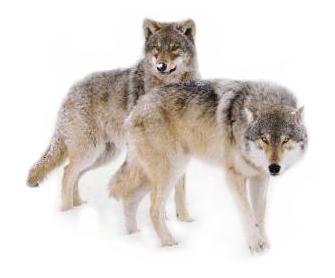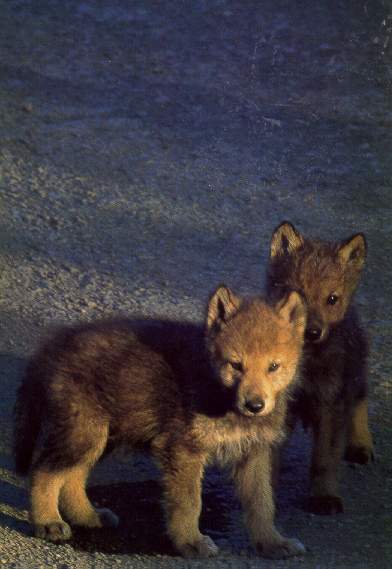Conflicting
views - what happens now?
There is hope for the return of the wolf. According to
Phillips and Smith (1996), by every measure the Yellowstone restoration project
has been successful and has generated benefits that extend beyond the immediate
preservation of the species, to positively affect local citizens and communities,
larger conservation efforts, and other imperiled species. However, it has been
a "raging war" over gray wolves ever since they were reintroduced five years
ago (Corbett, 2000). There are strong arguments and actions being taken both
for and against the return of wolves to the American West, including controversy
over wolf population control.
 Zimen
(1981) stated that we must all gradually give way to the idea of an "ecologically
functioning community" in which all native animal species live side by
side with man. Is it our responsibility to restore the wolf to its simplified
ecosystem, granted that we removed the wolf in the first place? Or does there
a come a point when humans have to draw the line and stop interfering with nature?
Maybe we've done enough damage already and the environment should be allowed
to adapt and eventually evolve into a functioning ecosystem independent of this
top predator. Perhaps humans also need to realize that we share this earth,
and it is not at our disposal, or is it our right, to pick and choose which
species are allowed to inhabit the land and which species need to be removed
because we are inconvenienced. "Has the exploitation
of nature reached such a pitch that only those creatures who seem useful to
us have a right to life?" (Zimen, 1981).
Zimen
(1981) stated that we must all gradually give way to the idea of an "ecologically
functioning community" in which all native animal species live side by
side with man. Is it our responsibility to restore the wolf to its simplified
ecosystem, granted that we removed the wolf in the first place? Or does there
a come a point when humans have to draw the line and stop interfering with nature?
Maybe we've done enough damage already and the environment should be allowed
to adapt and eventually evolve into a functioning ecosystem independent of this
top predator. Perhaps humans also need to realize that we share this earth,
and it is not at our disposal, or is it our right, to pick and choose which
species are allowed to inhabit the land and which species need to be removed
because we are inconvenienced. "Has the exploitation
of nature reached such a pitch that only those creatures who seem useful to
us have a right to life?" (Zimen, 1981).
Some people are convinced that reintroducing the wolf
is a huge mistake. Local opponents of the Yellowstone wolf recovery claim that
"the wolf is like a cockroach and will creep outside of Yellowstone and
devour wildlife." Another local said "wolves don't feed and water
the livestock and they don't help raise food for people to eat, so what good
are they?" Advocates of reintroduction in Yellowstone have something different
to say. One local claimed that "only a fool would not agree to the placement
of this beautiful and essential animal," and that "wolves do not kill
people, fatty beef does" (Kellert, 1995) It seems that humans have brought
nature so firmly under our control that we are unable to tolerate a single disturbing
factor. "The scope, the casual irresponsibility, and the cruelty of wolf
killing is something else...[We] simply do not understand our place in the universe
and have not the courage to admit it" (Lopez, 1978 cited in Kellert, 1995).
"Still the question recurs, "Can we do better?"
The dogmas of the quiet past, are inadequate for the stormy present. The occasion
is piled high with difficulty, and we must rise with the occasion. As our case
is new, so we must think anew, and act anew" Abraham Lincoln, address to Congress,
1862. The fate of the wolf is in our hands, and the future of the wolf
is important. Reintroducing this top predator in the United States is more than
returning a critical component of a biological system, it is symbolic of our
relationship with nature. Humans have a history of fearing what we can't control.
We got rid of this wild beast, and welcoming its return is a challenge as well
as an inspiration of hope for the future of nature on this earth.
"One
may well ask, doesn't it almost border on the absurd to waste words on the death
of an animal in a world in which millions are suffering from hunger, a world
with an ever increasing population, escalating use of energy, and a hyper-exponential
increase in destruction of the environment, while all the time the rich grow
richer and the poor grow poorer? Certainly - but for the fact that the extinction
of an animal species is symptomatic of the threat to ourselves. Once upon a
time the wolf was a symbol of our fear of nature, our struggle against it: now
it has become a symbol of our fear for nature, the environment that is all of
ours. In the light of the consequences that are now becoming evident, the worst
possible advice that could have been given to humanity was: Make yourselves
masters of the world. It is becoming clear to us that it should have been: Adapt
yourself to life in the world. Even though it sometimes takes generations for
new ideas to be accepted, there is some hope for us all - as well as for that
hunted hunter, the wolf." Zimen 1981

"Maybe
120 years from now, Yellowstone managers will be able to look back on this
project and make some meaningful judgments on the ecological and spiritual
consequences of what we've done today. For the moment, all we can do is
give ourselves a little credit for having the belated decency to right such
a long-standing wrong and pray for puppies." Paul Schullery (Phillips and
Smith, 1996)
return to Coexistence
with Humans
return home
 Zimen
(1981) stated that we must all gradually give way to the idea of an "ecologically
functioning community" in which all native animal species live side by
side with man. Is it our responsibility to restore the wolf to its simplified
ecosystem, granted that we removed the wolf in the first place? Or does there
a come a point when humans have to draw the line and stop interfering with nature?
Maybe we've done enough damage already and the environment should be allowed
to adapt and eventually evolve into a functioning ecosystem independent of this
top predator. Perhaps humans also need to realize that we share this earth,
and it is not at our disposal, or is it our right, to pick and choose which
species are allowed to inhabit the land and which species need to be removed
because we are inconvenienced. "Has the exploitation
of nature reached such a pitch that only those creatures who seem useful to
us have a right to life?" (Zimen, 1981).
Zimen
(1981) stated that we must all gradually give way to the idea of an "ecologically
functioning community" in which all native animal species live side by
side with man. Is it our responsibility to restore the wolf to its simplified
ecosystem, granted that we removed the wolf in the first place? Or does there
a come a point when humans have to draw the line and stop interfering with nature?
Maybe we've done enough damage already and the environment should be allowed
to adapt and eventually evolve into a functioning ecosystem independent of this
top predator. Perhaps humans also need to realize that we share this earth,
and it is not at our disposal, or is it our right, to pick and choose which
species are allowed to inhabit the land and which species need to be removed
because we are inconvenienced. "Has the exploitation
of nature reached such a pitch that only those creatures who seem useful to
us have a right to life?" (Zimen, 1981).